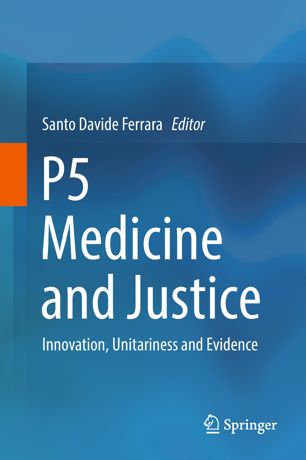P5 پزشکی و عدالت: نوآوری، وحدت و شواهد ۲۰۱۸
P5 Medicine and Justice: Innovation, Unitariness and Evidence 2018
دانلود کتاب P5 پزشکی و عدالت: نوآوری، وحدت و شواهد ۲۰۱۸ (P5 Medicine and Justice: Innovation, Unitariness and Evidence 2018) با لینک مستقیم و فرمت pdf (پی دی اف)
| نویسنده |
Santo Davide Ferrara |
|---|
| تعداد صفحهها |
635 |
|---|---|
| نوع فایل |
|
| حجم |
20 Mb |
| سال انتشار |
2018 |
89,000 تومان
معرفی کتاب P5 پزشکی و عدالت: نوآوری، وحدت و شواهد ۲۰۱۸
این کتاب وضعیت هنر و چشم اندازهای آینده مهم ترین زیرشاخه های بیولوژیکی و پزشکی را در چارچوب پزشکی شخصی سازی شده پسا ژنومی توصیف می کند. این کتاب با تمرکز بر سه موضوع اصلی: نوآوری، وحدت و شواهد، طیف گسترده ای از موضوعات را شامل می شود، از جمله: علوم زیست حقوقی، پزشکی و پزشکی قانونی، آسیب شناسی قانونی و انسان شناسی، و پزشکی قانونی و بالینی در افراد زنده (از خشونت بین فردی). به صدمات و آسیب های شخصی) قصور، شناسایی شخصی و تخمین سن)، ژنتیک و ژنومیک پزشکی قانونی، سم شناسی و تصویربرداری.
واحد “علم بی حقوقی”، که از لحاظ تاریخی بر اساس سختگیری و دقت روشهای تعیین و معیارهای ارزیابی بنا شده است، باید بر اساس شواهد مولکولی مجددا تاسیس شود و برای پیشبرد عدالت شخصی مورد استفاده قرار گیرد.
<
نتیجه گیری های کتاب و دیدگاه های آینده با هم چشم اندازی را برای نوآوری میان رشته ای و شواهد آینده در چارچوب عدالت شخصی ترسیم می کنند.
This book describes the state of the art and future prospects of the most important bio-medicolegal subdisciplines in the post-genomic framework of personalized medicine. Focusing on the three main themes Innovation, Unitariness and Evidence, the book addresses a wide range of topics, including: Bio-Medicolegal and Criminological Sciences, Forensic Pathology and Anthropology, Clinical and Forensic Medicine in Living Persons (from Interpersonal Violence to Personal Injury and Damage, Malpractice, Personal Identification and Age Estimation), Forensic Genetics and Genomics, and Toxicology and Imaging.
The unitariness of the “Bio-Medicolegal Sciences”, historically founded on the accuracy and rigor of the methods of ascertainment and criteria of evaluation, should be re-established on the basis of molecular evidence, and used to promote Personalized Justice.
Taken together, the book’s conclusions and future perspectives outline a vision of transdisciplinary innovation and future evidence in the framework of personalized justice.



